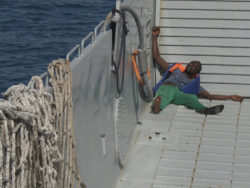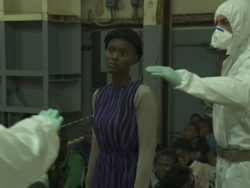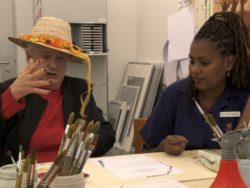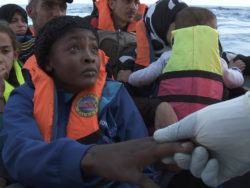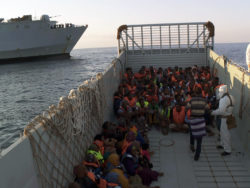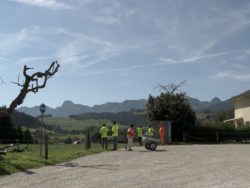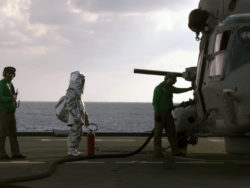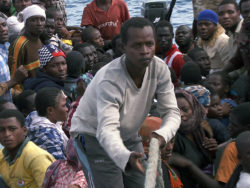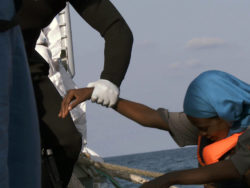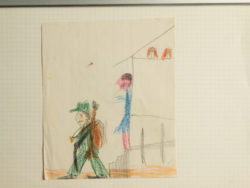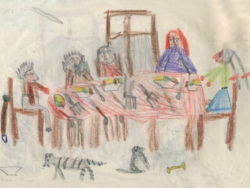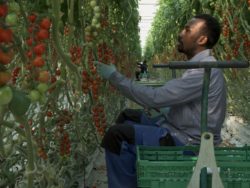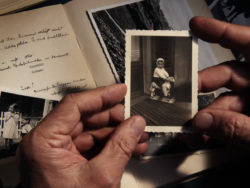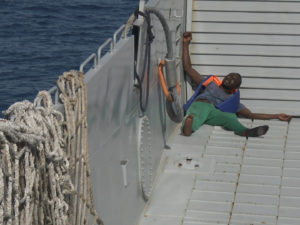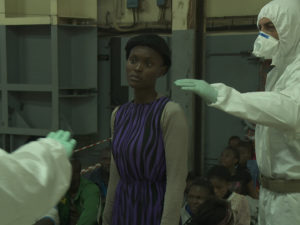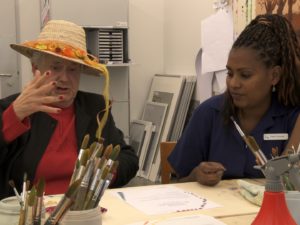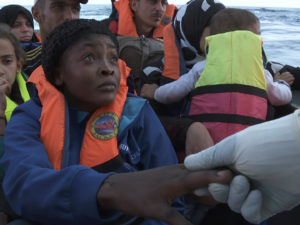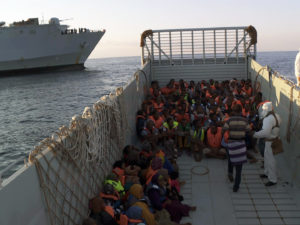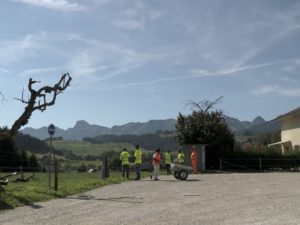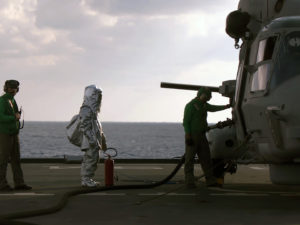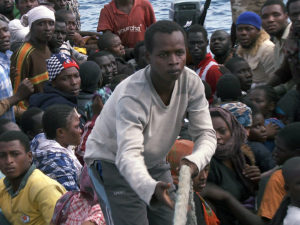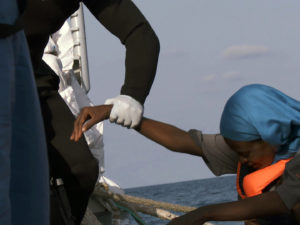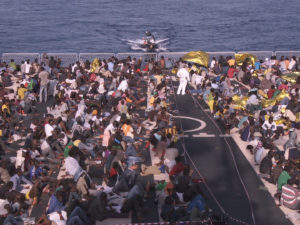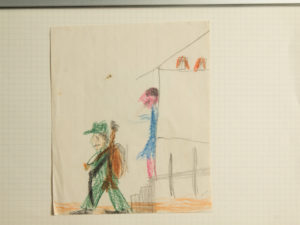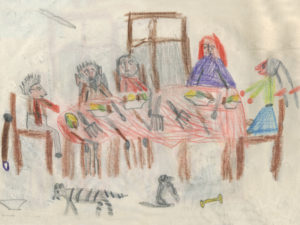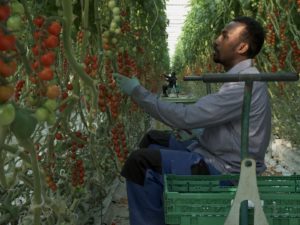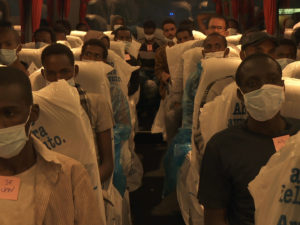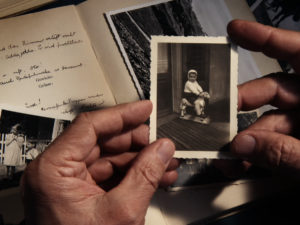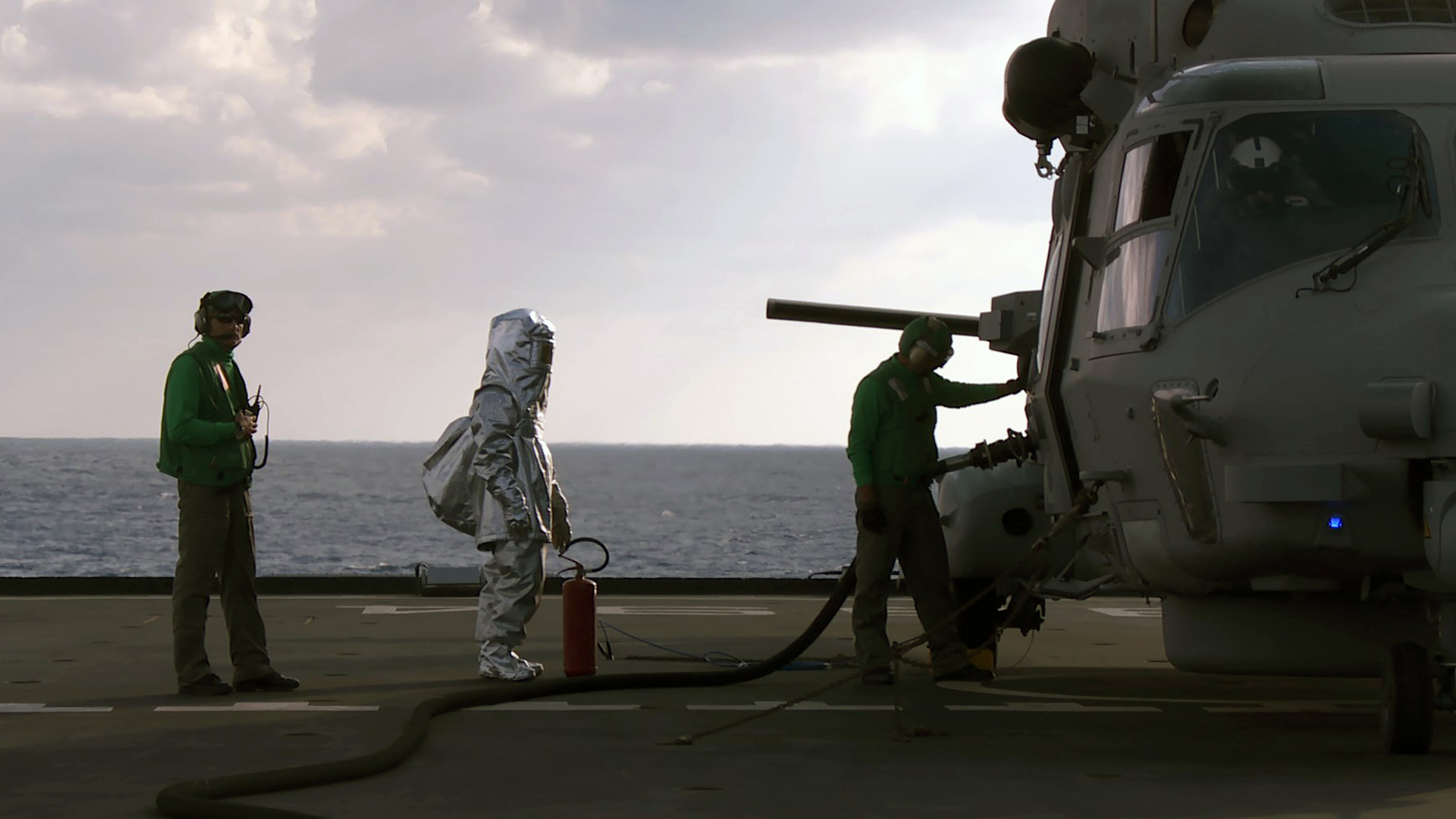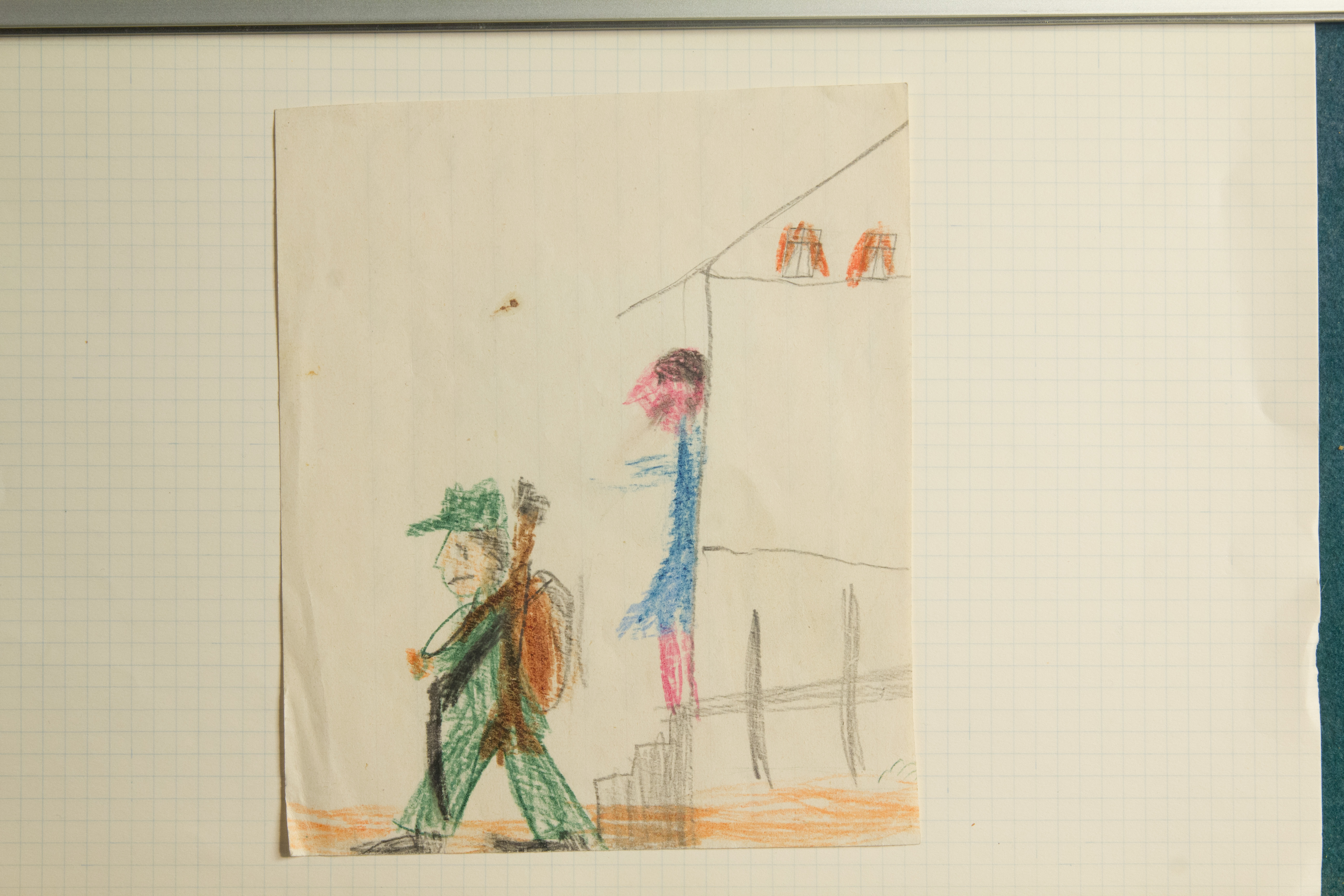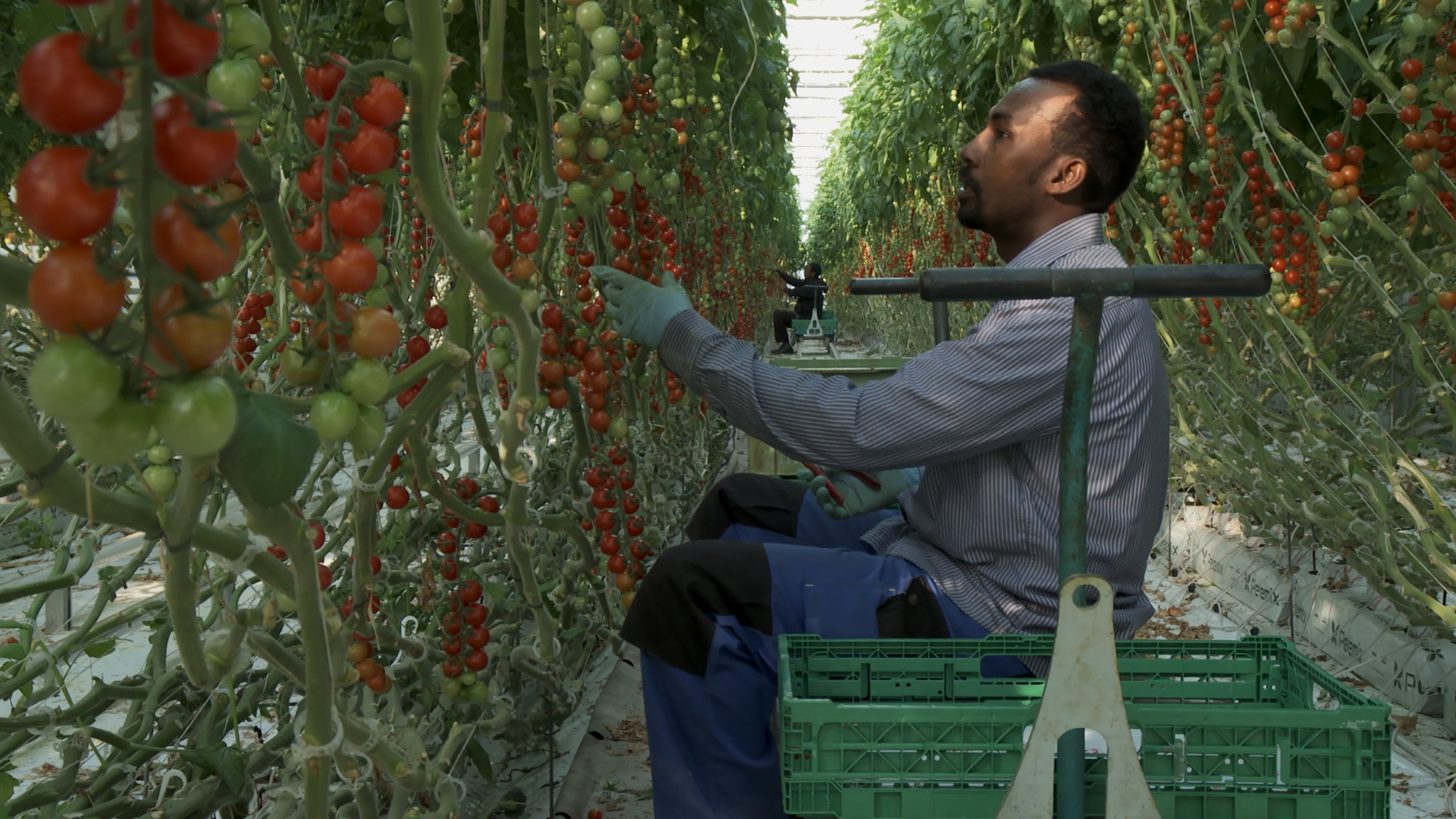Inhaltsverzeichnis
Throughout history, there have always been refugees. They used to come from places closer to home.
In the last years of WW II, the family of Swiss director Markus Imhoof, a small boy of four years at that time, took in Giovanna, an undernourished eight-year-old Italian street child as part of a limited-term program for children from war-torn countries. After half a year, she had to go back to Italy – “One mustn’t form too much of an emotional connection” said the Red Cross. The Imhoof family privately arranged for Giovanna to come back for a second time. In the end, the Swiss government insisted again on sending Giovanna back to Italy, as only foreign workers had the right to stay. She died of illness at the age of thirteen, soon after being forced to return.
Imhoof takes this early experience of personal loss as a point of entry to the on-going refugee crisis, the biggest mass displacement of people since WW II. With extraordinary insights, Imhoof takes us on a journey – intertwined with his personal story – aboard the Italian warships of “Operation Mare Nostrum,” inside the governmental refugee camps in Southern Italy, the refugee Ghetto of the Mafia, along difficult attempts to cross the border to Switzerland, into asylum hearings with Swiss authorities, only to see how most of the hopeful have to return back to their home countries, finding themselves in the same situation as before the journey. What the film doesn’t show: today the situation is even worse, the Italian marine prevents the refugees to reach their “Eldorado” – the European coast. The boats are sent back immediately to Libya, where they end up in notorious prisons, where blackmailing, sexual abuse and slave traffic are a daily business – all financed by the European Union.
What emerges is a strong picture of an absurd and inhuman process that fails to address a human tragedy: A migrant crisis caused by economic imbalances, which turns the rich countries of the North into an Eldorado that so many of the less fortunate try to reach at all cost. This “Promised Land” is based on a broken promise.
Crew
Director and scriptwriter: Markus Imhoof
DoP: Peter Indergand (scs)
Sound: Dieter Meyer, Jürg Lempen, Hugo Poletti
Assistants to the director and research: Antonella Falconio, Marion Glaser, Giorgia De Coppi, Franziska Arnold
Script Collaboration and Editing: Beatrice Babin (BFS), Thomas Bachmann
Music: Peter Scherer
Narrators: Caterina Genta, Robert Hunger-Bühler
Sound design: Sebastian Tesch
Sound mix: Ansgar Frerich
Title & Animation: Jutojo, Johannes Braun & Toby Cornish
Line producer: Tassilo Aschauer
Producers: Thomas Kufus, Pierre-Alain Meier, Markus Imhoof
Editorial: Urs Augstburger (SF), Sven Wälti (SRG, SSR Nationale Koordination), Carlos Gerstenhauer (BR), Matthias Leybrand (BR), Thanks to Hubert von Spreti (BR), Sonja Scheider (BR), Thanks to Hubert von Spreti (BR), Sonja Scheider (BR),
A co-production: between zero one lm, Thelma Film, Ormenis Film
In co-production with Schweizer Radio und Fernsehen, SRF, SRG SSR and Bayerischer Rundfunk
Supported by: Die Beauftragte der Bundesregierung für Kultur und Medien (BKM), Filmförderungsanstalt (FFA), FilmFernsehFond Bayern (FFF), Bundesamt für Kultur (EDI), Schweiz
Zürcher Filmstiftung, Cinéforom and Loterie Romande, Kulturfonds Suissimage Marlies Kornfeld, Volkart Stiftung, Ernst Goehner Stiftung
Werner Merzbacher, UBS Kulturstiftung, SRG Succès Passage Antenne, BAK Succès Cinéma
Switzerland, Germany 2018 TRT: 91 minutes
Festivals
San Francisco, Berlin & Beyond Film Festival, 17.10.2019.
Hong Kong, 1905 International Human Rights Film Festival, 22.08.2019.
Sao Paulo, Ecofalante Film Festival, 30.05.-12.06.2019
Singapur, European Union Film Festival in Singapore , 10.05.-19.05.2019
Milano, Festival Diritti Umani, 02.05.-04.05.2019
Addis Abeba, Addis International Film Festival, 30.04.-05.05.2019
Leuven, Afrika Film Festival, 26.04-11.05.2019
Turnhout, MOOOV Film Festival. 23.04.-05.05.2019
Colorado, ACT Human Rights Film Festival, 05.-13.04.2019
Pordenone, Le voci dell’inchiesta – Pordenone Docs Fest , 15.04-19.04.2019
Bukarest, One World Romania Human Rights Documentary Film Festival, 15.03.-24.03.2019
Maine, Maine Jewish Film Festival, 20.-18.03.2019
Hong Kong, European Union Film Festival, 05.03.2019
Victoria, Victoria Festival, 01.02-10.02.2019
Solothurn, Solothurner Filmtage – Journées de Soleure – Giornate di Soletta , 24.01.-31.01.2019
Palm Springs, Palm Springs International Film Festival, 03.01.-14.01.2018
Zürich, Human Rights Film Festival, 05.12.-10.12.2018
Zagreb, Rijeka, Human Rights Film Festival, 02.12.-09.12.2018
Zürich, Alors Festival, 16.11.-18.11.2018
Cork, Cork Film Festival, 09.11.-18.11.2018
Trento, Tutti Nello Stesso Piatto – Festival Internazionale di Cinema Cibo & Video Diversita, 06.11.-25.11.2018
Nantes, Deutsches Filmfestival Univerciné Allemand, 06.11.-12.11.2018
Toronto, Diaspora Film Festival, 01.-04-11.2018
Lissabon, DocLisboa, 18.10.-28.10.2018
Prag, DAS FILMFEST, 17.10.-23.10.2018
London, BFI Filmfestival London, 16.10.-18.10.2018
Gent, Filmfestival Gent, 10.10.-15.10.2018
Lugano, Film Festival Diritti Umani, 09.10.-14.10.2018
Turin, Polo del’900, 01.10.-24.11.2018
Vancouver, Vancouver International Film Festival, 27.09.-03.10.2018
Delémont, Delémont Hollywood, 24.09-30.09.2018
Marseille, Kino Visions Festival – Festival du Cinéma en langue allemand, 20.09.2018
Telluride, 45th Telluride Film Festival, 31.08.-03.09.2018
Ludwigshafen am Rhein, Festival des Deutschen Films , 23.08-07.09.2018
Wellington, The New Zealand International Film Festival , 30.06-, 12.08.2018
Locarno, 71. Locarno Festival , 05.08.2018
Stuttgart, SWR Doku Festival, 27.-30.06.2018
Ljubljana, Festival of Migrant Film, 18.06.2018
Incheon, Diaspora Film Festival – Incheon Film Commission, 18.05.-22.05.2018
Tel Aviv, DocAviv – the Tel Aviv International Documentary Film Festival 17.05.-26.05.2018
Warschau, Millenium Docs Against Gravity Festival 11.05.2018-20.05.2018
Teheran, Fajr International Film Festival, 17.04.-27.04.2018
Nyon, Visions du Réel, 15.04.-17.04.2018
Hong Kong International Film Festival, 19.03-05.04 2018
Recklingshausen, Kirchliches Filmfestival Recklinghausen, 14.03.2018
ELDORADO Premiere 68. Berlinale, Berlin, 15.02.-25.02.2018
Theatrical Release Italy, 14.04.-24.05.2019
Pre-Premiere France, Paris, 21.03.2019
Theatrical Release Germany, 23.04.-30.04.2018
Switzerland Tour 27.10.-01.11.2018
Theatrical Release Switzerland, 08.03.-14.03.2018
Awards
Swiss Filmaward for best Cinematography, nomination for best Doc and best Music, Geneva
Switzerland, Zürcher Filmaward 2018
Switzerland, Human Rights Award Filmfestival Diritti Umani Lugano (09.-14-10-2018)
Switzerland’s official OSCAR®-entry for the 91. Academy Awards, for „Foreign Language Film“ and „Best Documentary Feature“
Germany, Bavarian Filmaward 2019 for best Doc, Munich
German Documentary Award 2018, SWR Doku Festival, Stuttgart (Nomination)
Germany, Special mention – 14. Amnesty International Filmaward, Berlinale – 68. Internationale Filmfestspiele Berlin 2018 (15.02.-25.02.2018)
Italy, Audience Award Film Festival Le Voci dell‘ Inchiesta , Pordenone (15.04-19.04.2019)
Poland, Special mention – Lower Silesia Grand Prix, Millenium Docs Against Gravity Festival (11.05.2018-20.05.2018)
USA, Bridging the Borders Award 2019, Palm Springs International Film Festival
Human Rights Award 2018, WACC EUROPE http://www.wacceurope.org/human-rights-award-2018-goes-to-eldorado/
Director’s Note
Foreign countries played a significant role in our family: My father wrote his Ph.D. thesis on European emigrants, my mother was born in India, one of my aunts came from Odessa, the other lived in Egypt, my uncle lived in Columbia, another one in the US. Throughout my childhood, I hung a map of Africa over my bed, with a real spear pointing to the “Heart of Darkness”.
In 1945, Giovanna arrived from Italy in a Switzerland spared by the war. It was right around this time that I discovered, that everybody else, too, used “I” to refer to themselves. I fell in love with the foreign “I“. This shaped my life decisively. During this time, Switzerland resorted to the formulation: “Refugees for purely racial reasons do not count as refugees”, because most fell under this category. 24.000 people who had saved themselves were sent back – because presumably we would have drowned under the weight of these additional passengers. In 1980, I shot the fiction feature THE BOAT IS FULL about these events, the story of a randomly put together group of refugees who were sent back to their deaths. For the role of the refugee girl Kitty I looked for a girl that resembled Giovanna. As a direct result of WW II, racial discrimination today is recognized as grounds for asylum in the first paragraph of the Geneva Convention.
One of today’s principles is: “Refugees for reasons of economic plight do not count as refugees,” because most fall under this category. I would not have thought 35 years ago that the title of my film would be concrete and urgent enough once again to force me to shoot another film on the subject. Following my last documentary MORE THAN HONEY I began to work on two film projects: one about migration and one about money. While doing research, I soon discovered how tightly related these two themes are, and that the theme of migration cannot be told independently from the topic of money. Each one of us carries a piece of Congo in our pockets: Rare earths in cell phones. 80% of coltan and cobalt is unearthed in primitive mines in Congo, but the profits of the commodity traders remain in Switzerland. And the European trade agreements with Africa for the toll-free import of our agricultural products distort the rules: African farmers cannot compete with our subsidized success. Globalization has «exported» the proletariat and so becomes economic colonialization: Money, rich people and goods travel globally; the poor must stay where they are. The economic high and low-pressure areas distributed around the world are the precondition for the cheapest possible production of the flood of goods. Do we need the poorer parts of the world for our economic dynamism? The wheel of our mill needs different levels to turn. People claiming asylum are a consequence of this dynamic. Our fortune attracts them. But they disturb the increase of wealth and economic growth. Hence the laws against immigration to Europe. Defence is left to the natural force of the sea. Since 2000, more than 30.000 people have drowned during their flight: a small town of corpses. Human lives as the collateral damage of our wealth and our “pursuit of happiness”. This crisis is not over, it is merely beginning. Soon, refugees from climate change will arrive, too.
The memory of Giovanna gives me the radicalism of a child’s point of view, a fruitful contrast to the international machinery that administers strangers. It was never this difficult to obtain shooting permits. Any project that is kept so closely under wraps must have legitimacy. But hidden as it is in some ways, it tops agendas in election and coalition negotiations. Our challenge was to make the invisible visible. Matters of principle are often betrayed by a detail, a glance, laughter. The sum of the inconsequential sometimes reveals the essential. At its core, this story is about the conflict between «I» and «Us», about the contrast or the interplay between many different things in one whole. Just like in an orchestra, where it is not the trumpet that dominates everything but where we also hear the viola and flute. It is about hoping for an equilibrium, for North and South living together as one organism that does not permanently exploit and thus destroy itself. Everybody else call themselves «I», too. This can lead to war or be the beginning of a love story. On the door of a tailor’s workshop run by women refugees, there hangs a quote from «Alice in Wonderland»: “There’s no use trying,” Alice said: “one can’t believe impossible things.” “I daresay you haven’t had much practice,” said the Queen. “When I was your age, I always did it for half-an-hour a day. Why, sometimes I’ve believed as many as six impossible things before breakfast.”
Markus Imhoof, January 2018
Historical Background of children’s transports
The Children’s Aid of the Swiss Red Cross was an aid program between January 1942 and 1955 for the benefit of children from multiple European countries who suffered from the consequences of war. Children in poor health or those who had lost family members and whose conditions allowed for them to be brought to Switzerland for a three to six-month stay were sent to Swiss families, sanatoriums or summer camps. The Swiss Children’s Aid’s origins were not on the federal level. Moved by the events of WW II, 17 aid programs and NGOs came together to form the Swiss Association for War-damaged Children (Schweizerische Arbeitsgemeinschaft für kriegsgeschädigte Kinder, SAK). Because SAK both lacked the necessary personnel and financial resources and was seen as too “political“, this humanitarian aid was reorganized in 1942 within a larger organization under the tutelage of the Swiss Red Cross (Schweizerisches Rotes Kreuz, SRK).
The organization of children’s transports by train to Switzerland was the biggest children’s aid mission after the end of WW II. Between 1940 and 1945, about 62.000 undernourished and sick children were beneficiaries of the program. After the war, the program was enlarged further to cover children from all of Europe, as children in need of rest and recuperation from Germany, Italy and Austria came to Switzerland. Until the end of the program in 1956, about 181.000 children were cared for by roughly 100.000 Swiss host families. Jewish children, however, were explicitly excluded early on from the children’s trains. The SRK, like all national organizations of the Red Cross, had a privileged relationship with the Federal Government and, especially in times of war, depended on official policies. The Swiss government was under intense national and international pressure. Humanitarian aid was one way to ease the strain. Accordingly, from an early date, children from German-occupied territories were integrated into children’s transports, providing a bargaining chip in Switzerland’s negotiations for the preservation of its neutral status. This was the origin of the trade between the Vichy and Swiss governments and the SRK described in the film: in exchange for recovery stays for two children, France issued a document of passage that allowed its holder to travel from Switzerland to the Atlantic coast, from where many Jews took ships to North and South America.
To better manage immigration and because the Swiss federal government didn’t want to close its borders due to the importance of tourism, a new distinction was introduced in 1938 between recognized “political refugees“ and „emigrants“ whose application was at the discretion of the immigration police. Refugees for “reasons of race” were explicitly not counted as political refugees. For “non-Aryans” crossing the border from Germany, visas were strictly enforced, and they could only be issued with a guarantee that the foreigner in question would leave Switzerland again. The passports of German Jews were additionally marked with a stamped “J” and thus rendered invalid for immigration into Switzerland. Overall, according to different sources, about 10.000 to 20.000 people were turned away at the border or handed over to the Nazis, although it had become apparent that this would very likely lead to their deaths. In 2002, a parliamentary commission came to the result that the Swiss refugee laws of the time were not compatible with the principle of the rule of law.
Giovanna’s story
In 1945, eight-year-old Giovanna Viganò comes to Switzerland and the Imhoof family on one of these children’s transports. Giovanna is a malnourished street kid. Her father is M.I.A. in Stalingrad and presumed dead, her mother is too ill to care for her daughter.
In 1946, Giovanna has to return to Milan. The Imhoof’s want to keep her for longer, but the Red Cross advises that it wouldn’t do to let emotional ties become too strong.
Back home in Italy, her mother is still sick, their poverty is great, there is not enough to eat, the windows have been broken since a bomb raid and are only provisionally covered with oiled paper. They lack for everything, and it is cold because they have no money for heating materials.
The mother solders radio antennas in her kitchen for a small workshop. She later works in a cigarette factory. Giovanna is often sick, suffers from rheumatic fevers and is underfed. The parcels with gifts and money transfers are not enough.
In 1949 the Imhoof family wants to take Giovanna, now 13, back privately (Markus is 8 years old).
But to get into Switzerland as a foreign child is difficult due to regulations about seasonal workers. They live in shanty towns in Switzerland, work mostly in construction and have to go back to their countries for three months every year. They have no right to bring children into the country. The intention is, as it still is today, to prevent „chain migration“. There are more than half a million Italians, often victims of racial discrimination.
Markus’s father has to vouch for all costs and guarantee her return. Giovanna is finally allowed to come. But already in 1950, she has to go back to Milan – and soon is sick again.
Giovanna dies that same year (Markus now is 9 years old). The Imhoof parents blame themselves until the day they die.
1978: Markus lives in Milan, but with another Italian-speaking woman. Giovanna’s mother often looks after their children. He writes the script to the refugee drama DAS BOOT IST VOLL (The Boat Is Full) about the deportation of Jewish refugees from safe Switzerland back into the German Reich and certain death during WW II.
In 1981, the film is shown at Berlinale and awarded a Silver Bear. A year later, it is nominated for an Oscar®.
Behind the camera
Thomas Kufus (zero one film) – Producer
Thomas Kufus is one of the most influential independent documentary film producers in Germany. Over the last 25 years, he has produced over 100 documentary films, series and feature films, including award-winning films such as Lars Kraumes DER STAAT VS FRITZ BAUER (German Film Award 2016), Julia Albrecht’s “The Consequences of the Act” ( Grimme Preis 2016), Markus Imhoof’s MORE THAN HONEY (German Film Award 2013 and Austrian and Swiss Film Awards), WEST by Christian Schwochow (FIPRESCI Prize Montréal Film Festival and German Film Prize for Jördis Triebel), Corinna Belz ‘GERHARD RICHTER PAINTING (German Film Award 2012) , Arnon Goldfingers THE APARTMENT (Ofir Award) and BLACK BOX BRD by Andres Veiel (European and German Film Awards). In addition, his production company zero one film produced several films with the renowned Russian director Aleksandr Sokurov (including MOLOCH, FATHER AND SON, FRANCOFONIA). Together with business partner and director Volker Heise, he realized trailblazing, documentary television formats such as “24h Berlin – One Day in Life” and “24h Jerusalem” (both German Television Award) and “Schwarzwaldhaus 1902”. For 24h Jerusalem, zero one film 2014 received the German Television Award and Thomas Kufus the Producer Award of the German Academy of Television. In 2017, the 24-hour documentary “24h Bayern” was broadcast with great success. Thomas Kufus is a member of the European and German Film Academy. From November 2009 until the beginning of 2015, he was also its CEO. Since 2016 he has been the bearer of the Federal Cross of Merit.
FILMOGRAPHY (selection):
| 2018 | ELDORADO | |
| 2017 | BEUYS | |
| 2016 | 24 WOCHEN | |
| 2015 | FRANCOFONIA | |
| 2015 | DER STAAT GEGEN FRITZ BAUER | |
| 2015 | „Die Folgen der Tat“ | |
| 2015 | DOMINO EFFEKT | |
| 2014 | „24h Jerusalem“ | |
| 2013 | WESTEN | |
| 2013 | „Zeit der Helden“ | |
| 2012 | MORE THAN HONEY | |
| 2011 | DIE WOHNUNG | |
| 2011 | GERHARD RICHTER PAINTING | |
| 2011 | WER WENN NICHT WIR | |
| 2009 | „24h Berlin“ | |
| 2003 | DIE KINDER SIND TOT | |
| 2003 | VATER UND SOHN | |
| 2002 | „Schwarzwaldhaus 1902“ | |
| 2001 | BLACK BOX BRD | |
| 1997 | MUTTER UND SOHN | |
| 1996 | A TICKLE IN THE HEART | |
| 1994 | VERBORGENE SEITEN | |
| 1991 | BLOCKADE | |
| 1989 | MEIN KRIEG |
Pierre-Alain Meier (Thelma Film) – Producer
With Thelma Film, founded in 1988, Pierre-Alain Meier has produced more than thirty feature and documentary films in various countries, including: in Argentina MEMORIA DEL SAQUEO by Fernando Solanas (Berlinale 2004, Goldener Ehrenbär), in Cambodia THE RICE FIELD of Rithy Panh (Cannes Filmfestival 1994, International Competition), in Senegal HYENAS by Djibril Diop Mambéty (Cannes Filmfestival 1992, Int. Competition), in Burkina Faso YAABA by Idrissa Ouedraogo (Cannes Film Festival 1989, opening film of the Director’s Forthnight), in Algeria BAB EL OUED CITY by Merzak Allouache (Cannes Film Festival 1995), in Serbia ORDINARY PEOPLE (Cannes Film Festival 2009), in Palestine SALT OF THIS SEA by Annemarie Jacir (Cannes Film Festival 2008), in Chad FAR FROM THE VILLAGE by Olivier Zuchuat (IDFA-Festival 2008), as well as in Switzerland MORE THAN HONEY by Markus Imhoof (Locarno, Piazza Grande 2012). In addition, he has made several documentary films, most recently ADIEU A L’AFRIQUE, which he presented in 2017 in the competition of Visions du Réel, as well as a feature film, THELMA (2001). To produce FLAMMEN IM PARADIES (1997), Pierre-Alain Meier founded the Flimpa Filmproduktion in Zurich together with Markus Imhoof and the distributor Thomas Koerfer (Frenetic Films) in 1995, which was later renamed Ormensis Film. In 2008 Markus Imhoof took over the company.
FILMOGRAPHY (selection):
| 2018 | ELDORADO | |
| 2017 | ADIEU L’AFRIQUE | |
| 2012 | MORE THAN HONEY | |
| 2011 | UN ETE BRÛLANT | |
| 2009 | ORDINARY PEOPLE | |
| 2008 | DAS SALZ DES MEERES | |
| 2007 | DIE UNSANFTE (Pas Douce) | |
| 2005 | LA DIGNIDAD DE LOS NADIES | |
| 2004 | MEMORIA DEL SAQUEO –
DIE GLOBALISIERUNG HAT EIN GESICHT |
|
| 1995 | LES HOMMES DU PORT | |
| 1994 | DAS REISFELD | |
| 1992 | HYENAS | |
| 1989 | YAABA |
Peter Indergand – Cinematography
Peter Indergand was born on February 26, 1957 in Crest, France, is Swiss and lives in Frauenfeld. He studied art history and English for six semesters at the University of Zurich and then moved to the American Film Institute AFI in Los Angeles, where he graduated in 1982 in the field of camera. In 1984 Peter Indergand and Rolando Colla founded the film production company Peacock in Zurich. In 1989 he left Peacock and since then works as a freelance cameraman. The collaboration with Rolando Colla continued in the films LE MONDE à L’ENVERS, Oltre IL CONFINE and L’AUTRE MOITIÉ. Since then, Peter Indergand has photographed numerous feature and documentary films in various countries and worked with directors such as Markus Imboden, Miguel Alexandre, Marcel Gisler and Christoph Schaub. The work with Christian Frei plays an important role. The first highlight was the Oscar® nominated WAR PHOTOGRAPHER, which garnered international acclaim and for which Peter Indergand received an Emmy nomination, among other awards. Further collaborations with Christian Frei were THE GIANT BUDDHAS, SPACE TOURISTS and SLEEPLESS IN NEW YORK. Current works include the feature film “Stöffitown” by Christoph Schaub as well as the documentary films WILD WOMEN – GENTLE BEASTS by Anka Schmid, ELECTROBOY by Marcel Gisler and, most recently, GENESIS 2.0 by Christian Frei, who premiered at the Sundance Film Festival 2018. For his work as a cameraman, Peter Indergand has been repeatedly awarded, ia. with the Gold Panda Award at the Sichuan TV Festival and the Best Photography Award at the Beldocs International Documentary Film Festival.
FILMOGRAPHY (selection):
| 2018 | ELDORADO | |
| 2018 | GENESIS 2.0 | |
| 2015 | WILD WOMEN – GENTLE BEASTS | |
| 2014 | ELECTROBOY | |
| 2014 | „Stöffitown“ | |
| 2013 | SLEEPLESS IN NEW YORK | |
| 2013 | DIE REISE ZUM SICHERSTEN ORT DER ERDE | |
| 2009 | SPACE TOURISTS | |
| 2007 | L’AUTRE MOITIÉ | |
| 2007 | „Kleine Fische“ | |
| 2006 | PLAY YOUR OWN THING | |
| 2006 | „Störtebeker“ | |
| 2005 | THE GIANT BUDDHAS | |
| 2004 | „Grüße aus Kaschmir“ | |
| 2004 | STERNENBERG | |
| 2004 | NI OLVIDO NI PERDON | |
| 2002 | OLTRE IL CONFINE | |
| 2001 | WAR PHOTOGRAPHER | |
| 2001 | HEIDI | |
| 2000 | GRAN PARADISO |
Beatrice Babin – Cutter
Beatrice Babin successfully completed her studies in philosophy and film studies in 1990 with her Master’s thesis on Federico Fellini and the figure of the clown as a crossover between life and death. Longer stays between 1984 and 1999 in New York, Rome, Namibia, Brazil, Mozambique, Portugal nursed Babin’s curiosity for the Other and the Others for now. With the new millennium her travels have shifted into the world of montage: feature films, documentary films, art films – Babin describes every film as an adventure in itself. For them, montage is one of the most beautiful ways of thinking about time, life, transience, and people. Beatrice Babin is a member of the German Film Academy and the Bundesverband Filmschnitt.
FILMOGRAPHY (selection):
| 2018 | ELDORADO | |
| 2016 | LOU-ANDREAS SALOMÉ | |
| 2016 | DIE SCHÖNEN TAGE VON ARANJUEZ | |
| 2015 | SOLNESS | |
| 2013 | IN SARMATIEN | |
| 2012 | TÖTE MICH | |
| 2011 | „Heimat, Sex & andere Unzulänglichkeiten“ | |
| 2010 | DAS ROTE ZIMMER | |
| 2009 | BERLIN STETTIN | |
| 2008 | DAS FREMDE IN MIR |
Peter Scherer – Music
Peter Scherer studied piano and composition in Basel, Hamburg and New York. In New York in the early ’80s, he made contact with key figures in the downtown scene, including Laurie Anderson, Kip Hanrahan, Arto Lindsay, Bill Frisell, Nana Vasconcelos, and John Zorn, and has worked on numerous recording projects and performances ever since, playing with R & B artists such as Nile Rodgers, cameo and many others. It followed orders for film music u.a. for filmmakers such as Danae Elon (ANOTHER ROAD HOME), Markus Imhoof’s MORE THAN HONEY, Stina Werenfels’ DORA OR THE SEXUAL NEUROSES OUR PARENTS and Heidi Specognas CAHIER AFRICAIN. In the field of dance he has repeatedly worked as a composer for the Frankfurt Ballet and for O Vertigo Danse Montreal. Peter Scherer works today as a composer, producer, keyboardist and guitarist based in Zurich. His versatile career includes music for film and dance. He produces, arranges and plays with other artists from the entire spectrum of contemporary music. In addition, Peter Scherer currently teaches at the University of the Arts Bern in the Department of Music and Media Arts as well as at the University of the Arts in Zurich in the Department of Music for Film, Theater and Media.
FILMOGRAPHY (selection):
| 2018 | ELDORADO | |
| 2016 | CAHIER AFRICAIN | |
| 2015 | DORA ODER DIE SEXUELLEN NEUROSEN UNSERER ELTERN | |
| 2015 | DARK STAR – HR GIGERS WELT | |
| 2012 | WIE ZWISCHEN HIMMEL UND ERDE | |
| 2012 | NACHTLÄRM | |
| 2012 | MORE THAN HONEY | |
| 2011 | DIE GUANTANAMO FALLE | |
| 2011 | SIE HAT ES VERDIENT | |
| 2009 | ZWÖLF WINTER | |
| 2007 | MARMORERA | |
| 2004 | ANOTHER ROAD HOME | |
| 2002 | EPOCA – THE MAKING OF HISTORY |
International Distributors
Germany: Majestic Filmverleih
Switzerland: Frenetic
France: Jour2fete
Italy: ZaLab
Poland: Against Gravity
Romania: Cirko Films
South East Asia: Astro Shaw
USA: Kino Lorber
World Sales: Films Boutique
Press and Download
„Eldorado – a powerful look at the brutal lives of Europe’s refugees- sombre, unflinching and personal“
– Peter Bradshaw, The Guardian (UK)
“A big moving essay.“
– Die ZEIT
“A shocking and touching oeuvre. A documentary film that reveals the background and structures of the refugee crisis. Finally!“
– Martina Knoben, Süddeutsche Zeitung
„Enormous emotional energy“
– Paolo Mereghetti, Corriere della sera (Italy)
“Imhoof combines his most personal and painful experiences with dry, analytical observations. Eldorado is thus a very necessary empathic view of the on-going mass murdering. Today, only empathy still seems to be a driving force, able to break the emotional mechanism of ignorance that has become a routine.”
– Dieter Wieczorek, Modern Times Review
“Eldorado’s historical narrative is less vividly portrayed than its contemporary one, though that in itself is poignant: a reminder of how fragile individual migrants’ stories are to begin with, and how awareness of even their collective struggle can fade with time.“
– Guy Lodge, Variety
“The film’s enormously complex aspects and facts, which Markus Imhoof relates with his own biography, make ELDORADO an extraordinary work on fleeing and its causes […] Universal and deeply human.”
– Joachim Kurz, kino-zeit
“The silent, but uncompromising documentary ELDORADO is one of the most beautiful testimonies to the refugee crisis. By mixing the personal with observation, Imhoof succeeds in producing an impressive film that shows the truth.”
– Fionnuala Halligan, ScreenDaily
“Markus Imhoof‘s documentary Eldorado has a deeply humanistic approach.“
– Anke Westphal, Tagesspiegel
“Eldorado is a strong plea for a fair distribution of wealth in the world.”
– Anke Sterneborg, EPD Film
“A film against denial.“
– Irene Genhart, Filmdienst
„This film will be etched on your memory.“
– Susanne Ostwald, NZZ
Veröffentlichung der Fotos im Zusammenhang mit dem Film frei.
Download the press kit here
Eldorado Presskit – Swiss Distributor – German
Eldorado Presskit – Swiss Distributor – French
Eldorado Presskit – Berlinale – English
Eldorado Presskit German Distributor – German
Eldorado Presskit – US Distributor – English
